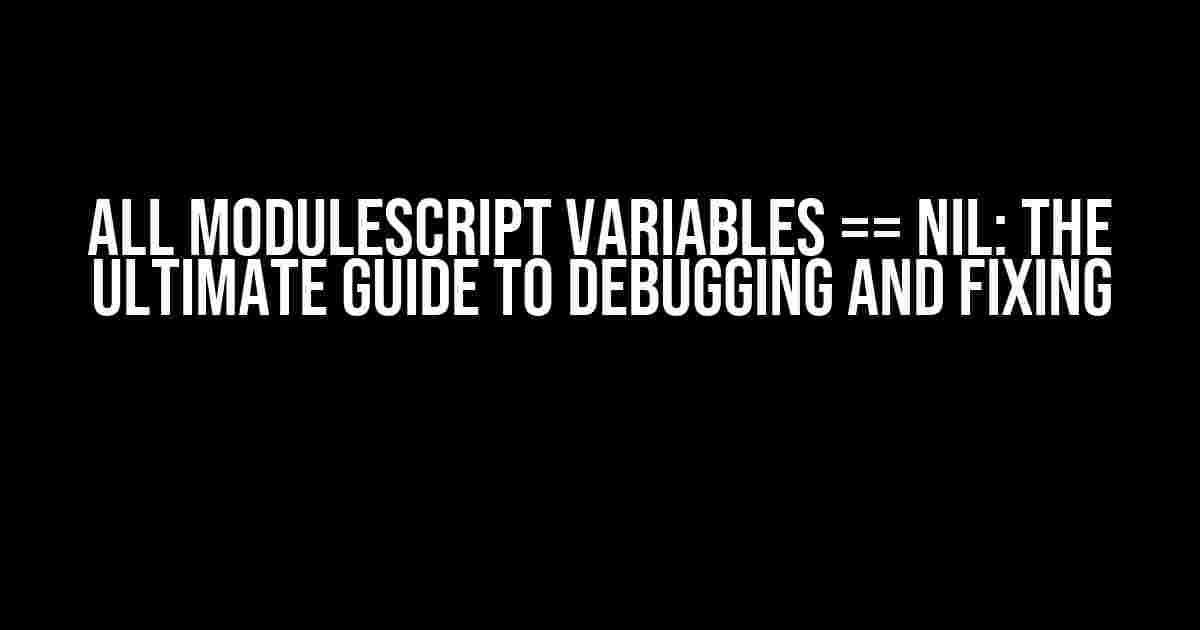Are you tired of encountering the frustrating “All ModuleScript variables == nil” error in your Roblox scripts? Do you find yourself stuck in an endless loop of debugging and frustration? Worry no more, dear developer! This comprehensive guide is here to help you understand, debug, and fix the issue once and for all.
What does “All ModuleScript variables == nil” mean?
The error message “All ModuleScript variables == nil” is a common issue in Roblox scripting, particularly when working with ModuleScripts. When this error occurs, it means that all the variables declared within the ModuleScript are being reported as nil, despite being defined correctly.
Causes of the issue
Before we dive into the solutions, let’s explore the common causes of this error:
- Incorrect ModuleScript setup: Failing to set up the ModuleScript correctly, resulting in variables not being recognized.
- Scope issues: Variables being declared outside the scope of the ModuleScript or in the wrong context.
- Requires and dependencies: Issues with requiring modules or loading dependencies incorrectly.
- Code organization and structure: Poorly organized code leading to confusion and errors.
Debugging Techniques
To fix the issue, we’ll need to employ some effective debugging techniques:
Step 1: Review your ModuleScript setup
Ensure that your ModuleScript is set up correctly:
- Verify that the ModuleScript is a direct child of the ReplicatedStorage or ServerScriptService.
- Check that the ModuleScript is named correctly and has a unique name.
- Confirm that the ModuleScript is not being used as a LocalScript.
-- Correct ModuleScript setup
local ModuleScript = Instance.new("ModuleScript")
ModuleScript.Parent = game.ReplicatedStorage
ModuleScript.Name = "MyModule"
Step 2: Inspect your code organization and structure
Organize your code to ensure clarity and maintainability:
- Use clear and descriptive variable names.
- Keep related functions and variables together.
- Avoid long, complex scripts; break them down into smaller, manageable chunks.
-- Well-organized code
local MyModule = {}
function MyModule.init()
print("Module initialized!")
end
function MyModule.doSomething()
print("Doing something...")
end
return MyModule
Step 3: Verify requires and dependencies
Double-check your requires and dependencies:
- Ensure that all required modules are correctly referenced.
- Check that dependencies are loaded in the correct order.
-- Correctly requiring a module local MyOtherModule = require(game.ReplicatedStorage.MyOtherModule)
Step 4: Test and iterate
Test your code thoroughly, making adjustments as needed:
- Use print statements or the Output panel to debug your code.
- Test individual components of your code to isolate the issue.
- Make incremental changes, testing after each modification.
Now that we’ve debugged our code, let’s explore some solutions and workarounds to the “All ModuleScript variables == nil” issue:
1. Using a separate ModuleScript for each set of variables
Create separate ModuleScripts for each group of related variables:
-- ModuleScript 1
local MyModule1 = {}
MyModule1.variable1 = "value1"
MyModule1.variable2 = "value2"
return MyModule1
-- ModuleScript 2
local MyModule2 = {}
MyModule2.variable3 = "value3"
MyModule2.variable4 = "value4"
return MyModule2
2. Using a single ModuleScript with tables
Store variables in tables within a single ModuleScript:
-- Single ModuleScript with tables
local MyModule = {}
MyModule.variables = {
variable1 = "value1",
variable2 = "value2",
variable3 = "value3",
variable4 = "value4"
}
return MyModule
3. Creating a custom namespace
Create a custom namespace to organize and isolate your variables:
-- Custom namespace
local MyNamespace = {}
MyNamespace.MyModule = {}
MyNamespace.MyModule.variable1 = "value1"
MyNamespace.MyModule.variable2 = "value2"
return MyNamespace
Conclusion
The “All ModuleScript variables == nil” error can be frustrating, but with the right debugging techniques and solutions, you can overcome it. By following the steps outlined in this guide, you’ll be well on your way to creating robust, error-free scripts that make the most of Roblox’s ModuleScript system.
| Common Causes | Debugging Techniques | Solutions and Workarounds |
|---|---|---|
| Incorrect ModuleScript setup | Review ModuleScript setup | Use separate ModuleScripts for each set of variables |
| Scope issues | Inspect code organization and structure | Use a single ModuleScript with tables |
| Requires and dependencies | Verify requires and dependencies | Create a custom namespace |
| Code organization and structure | Test and iterate | – |
By applying the knowledge and techniques presented in this guide, you’ll be able to tackle the “All ModuleScript variables == nil” error with confidence and ease. Happy coding!
Frequently Asked Question
Confused about ModuleScript variables being nil? Worry not, dear developer! We’ve got the answers to your most pressing questions.
Why are all my ModuleScript variables nil?
This is likely because the variables are not being initialized properly or are being accessed before they are set. Make sure to check your script’s execution order and ensure that the variables are being set before they are used.
Are there any exceptions to this rule?
Yes, there are a few exceptions! If you’re using a ModuleScript to store constants or readonly variables, they will not be nil. Additionally, if you’re using a ModuleScript as a singleton, the variables will persist across script executions.
How do I debug this issue?
To debug this issue, try printing the value of the variables at different points in your script’s execution. You can also use the Roblox Studio’s built-in debugger to step through your code and inspect the variables. Additionally, check the Output window for any error messages that may indicate what’s going on.
What are some common pitfalls to avoid?
One common pitfall is trying to access ModuleScript variables from a LocalScript. Remember, ModuleScripts run on the server, while LocalScripts run on the client, so they don’t have access to the same scope. Another pitfall is not accounting for the script’s execution order, which can lead to variables being accessed before they are set.
How do I ensure that my ModuleScript variables persist across script executions?
To ensure that your ModuleScript variables persist across script executions, you can use a singleton pattern or store the data in a DataStore. This way, the data will be saved and retrieved correctly, even when the script is restarted or the game is updated.
